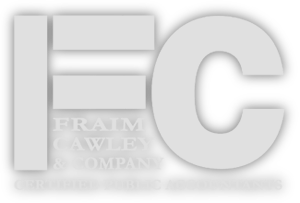Why Business Valuations Matter
As a business owner, it’s very important to know your business’ market value for a variety of situations. Obvious reasons would include the sale or merger of your business, expanding the business to secure new capital or even taking on new partners and determining their buy-in price. Or maybe you are nearing retirement and looking to formulate an exit strategy. Regardless of your circumstances, a valuation report is the most useful piece of financial information for the owner of any company. Our valuation model will help you get a fair and accurate accounting of your business’ value that will help you in a variety of business situations.
How Can a Certified Valuation Analyst Help You?
David Cawley and Micah Fraim are CPAs and Certified Valuation Analysts. The CVA designation is an indication to the business, professional, and legal communities that recipients have met the rigorous standards of professionalism, expertise, objectivity, and integrity in the field of business valuation, financial consulting and litigation, and related consulting disciplines.
Accurate Value Determination
The result of an inaccurate value determination, regardless of whether it is high or low, generally leads to undesirable consequences. For instance, if the value is too high, estate taxes will be too high; savvy investors or prospective buyers will usually disregard a value that appears too high. If the value is too low, you can be sure savvy investors or prospective buyers will recognize it and take advantage. Likewise, if you are on the other side of the dispute in a dissenting shareholder action or divorce, you certainly want to know you are receiving an accurate value for your interest.
Careful Analysis
Determining the true value of a business enterprise requires a careful analysis of two primary components that make up value: tangible assets such as real estate, machinery, and furniture used by the business; and various intangible assets such as business or personal goodwill. Intangible assets might also include customer lists, trademarks, copyrights, distribution rights, a superior management team, non-compete agreements, physical location, special processes, and name recognition.
Understanding the Business
To properly value a business enterprise, the CVA must acquire a thorough understanding of every aspect of a company’s dynamics, including: management capabilities, company strengths, weaknesses and vulnerabilities, the competitive environment, overall expectations for the marketplace, and future economic prospects for the industry and the economy in the region and as a whole. All of these elements affect the risk of ownership in a particular enterprise, and risk directly impacts value. Additionally, the valuator must analyze the inherent financial health of the enterprise and its future profit potential.
Sorting Through a Complex Process
After a thorough analysis of all the company’s dynamics and its financial health, the CVA must select the most appropriate methodology from among the many accepted by the valuation industry, and apply a series of calculations and formulas to arrive at the ultimate conclusion of value. Overall, the process is highly complex and requires a significant amount of time. Indeed, this is what is required to determine the true economic value of a privately owned business enterprise, and this is what a CVA brings to your table.
Our Process & Services
Our combined tax, accounting and financial expertise allows us to provide business valuation and litigation support to meet your specific needs.
Our services are provided for a wide range of clients including law firms, business buyers/sellers, banks, estate planners, and financial advisors. We offer full, detailed conclusions of value reports, calculation reports, and provide consulting services for business owners and legal representation alike.
We perform business valuations for circumstances including but not limited to:
Strategy & Transaction Planning
Exit / succession planning
Purchase or sale of business
Transaction negotiations
Buy / sell agreements
Settlement of estates
Gifting & ownership interests
Litigation Support
Marital disputes
Economic damages
Shareholder disputes
